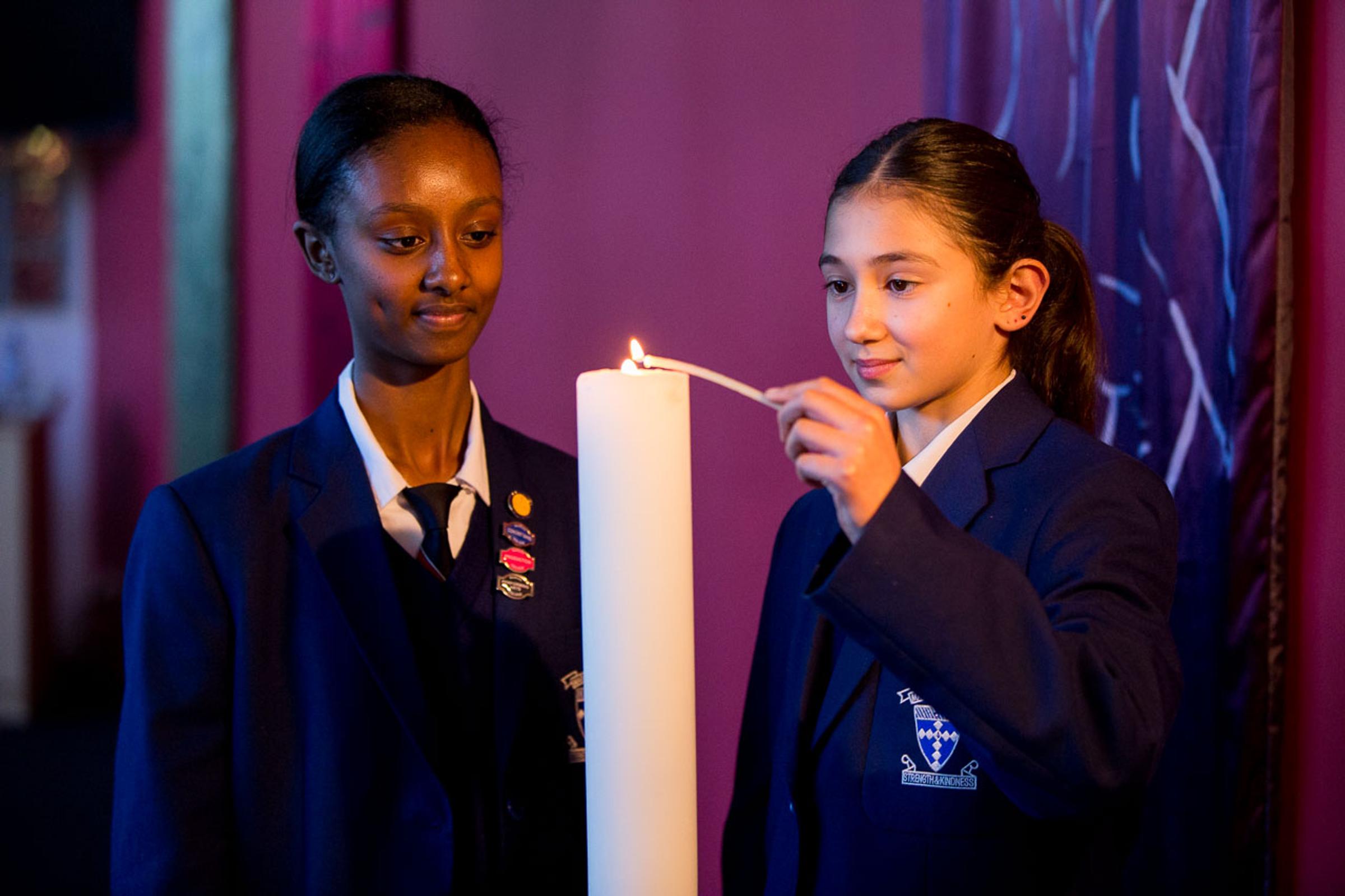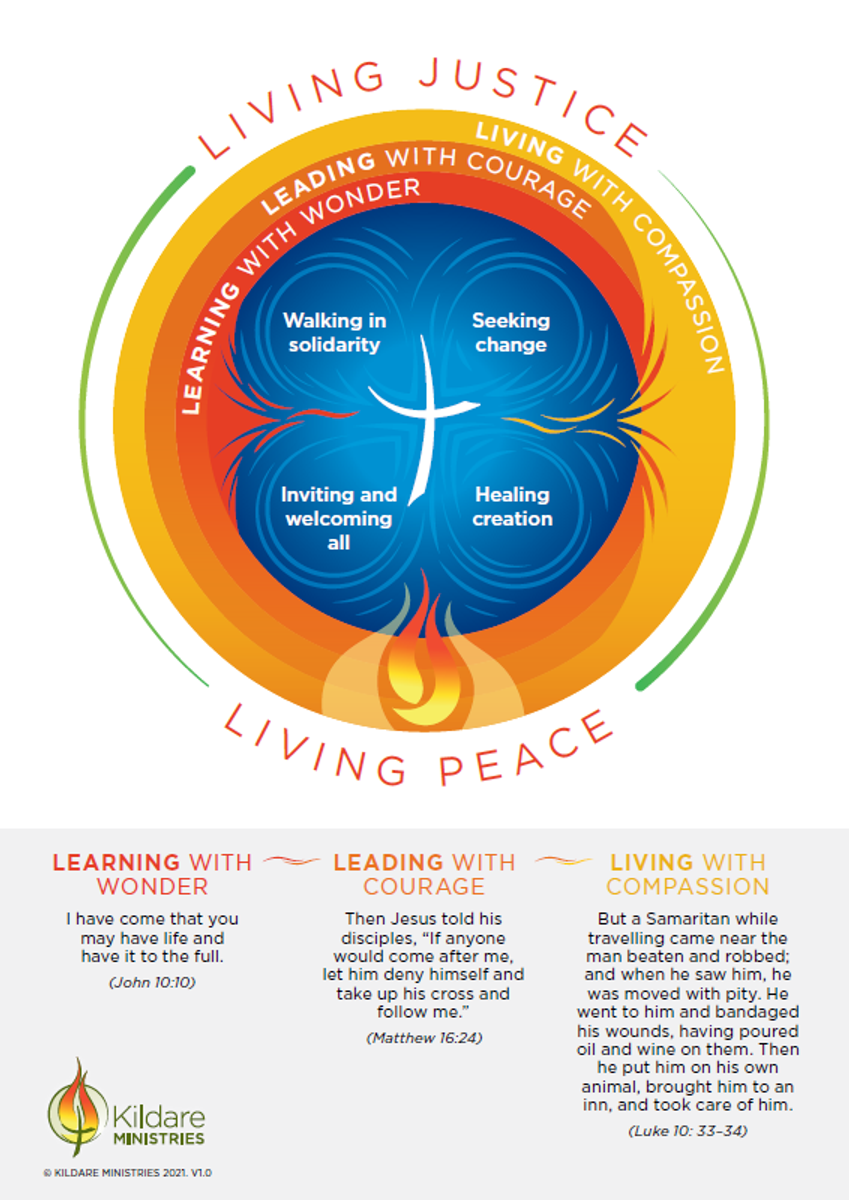Faith and Mission
Staff Formation Morning

Faith and Mission
Staff Formation Morning
Staff Formation Morning


On Friday 28 January, we welcomed Renee Oberin, Mission Leader with Kildare Ministries, to our Marian Staff Formation morning. Due to the restrictions of Covid-19 and not being able to meet face to face as we would normally do at the beginning of each school year, all staff zoomed in remotely. Renee took this in her stride and led us through an engaging exploration of our Living Justice Living Peace Charter. She then took us on a journey of storytelling, reflection on scripture and goal setting around our 2022 College Theme: Compassion Walking with and having empathy for all.
Part One: Living Justice Living Peace
Living Justice Living Peace
This charter is our paradigm for justice and a model for thinking about justice. It will be further explored throughout the year and students will learn more about it in their classrooms and units of work.
The Symbolism of Living Justice Living Peace
The flame represents the Kildare Ministries flame, which in itself is symbolic of St Brigid's lamp of learning and Nano Nagle's lantern.
The Cross identifies Marian College as a Christian school and is symbolic of welcoming people of all faiths and philosophies into our College community.
The Language is invitational and inclusive, is accessible to all and is excluding to no one.
Pope Francis says that Peace and Justice are the two sides of the one coin. We can’t have peace without justice. The word Living is used because we are challenged to generate creative responses to new social and cultural phenomena over time. It can be used as a road map to support these creative responses.
The Colours are representative of a flame. The shades of orange and red represent the aura of the flame, signifying the energy that moves us towards actions of justice. The blue is symbolic of the water in the well of St Brigit. It represents renewal, rejuvenation and contemplation and our need for continual spiritual nourishment from what we can learn from Scripture, Jesus’ ministry, our own life experiences and from others.
The lines within the red and blue auras indicate our movement within each of the elements of the charter and their interconnectedness with each other.
The Four Elements in the centre of the image are representative of some of the aspects of Jesus’ Ministry.
Inviting and Welcoming All: Going out and Inviting all.
Walking in Solidarity: Exploring class division and Preferencing the poor.
Seeking Change: Challenging oppression and Changing hearts.
Healing Creation. Protecting the dignity of all people and Protecting the dignity of creation.
We are impelled and energised by hope to learn from Jesus’ ministry and connect with our daily lives to learn with wonder, live with courage and lead with compassion.
Part two: Our College theme, Compassion Walking with and having empathy for all.
Renee led us through unpacking the Core Value of compassion through the lens of Scripture, with a focus on the compassionate relationship God offers us all. One such Scripture passage was from John’s Gospel, “My sheep hear my voice. I know them and they follow me.” John 10:27. Upon reflection on this passage, one interpretation is that we are the hands and feet of God, and it is our mission to hear the voice of others and put into action a means of supporting them with a compassionate heart.
The compassion of Jesus can be clearly seen throughout the Gospel narratives. Such examples are as follows: In Matthew 9:36 we observe Jesus’ compassion for the harassed and helpless. In Matthew 14:14 we see his compassion for those who are sick and suffer disease. In Matthew 15:32 we witness Jesus’ compassion for those who hunger and in Luke 7:11-15 we hear of his compassion for the widowed who were particularly vulnerable within the community.
We continued the exploration of compassion in Jesus’ ministry as I led staff through a recontextualised look at the symbolism within the story of the Good Samaritan from Luke’s Gospel. In groups, we read the passage and listened to the insightful words of Brisbane Archbishop Mark Coleridge who said that parables challenge us to think outside the normal conventions of society.. We discussed our insights into the story and shared examples from our own lives where we were moved by compassion to help someone else.
At the conclusion of the morning session, Renee left with a challenge to all Marian staff to reflect upon:
“Compassion may mean to enter into the suffering of another. Not just to feel it or to understand it because compassion is more demanding than sympathy and more demanding than empathy. It is the recognition that we are deeply connected through relationships with each other.”
Therefore, how can we discern with compassion? So what drives us to authentic moments of entering into the suffering of another? What makes us courageous to act for the needs of an individual, our society or our environment when others don’t?
We wholeheartedly thank Renee for leading us through this year’s theme and enabling us to reflect upon goals to embed Compassion, walking with and having empathy for all into our College practices, within our classrooms and embed it into our curriculum. We will continue this journey throughout the year and hear from staff and students on how they enact authentic practices of compassion in their daily lives.
Some staff comments from the day’s professional learning include the following:
“It is really challenging my ideas on what compassion is…”
“Hearing real life stories of people acting in compassionate ways has been quite emotional…”
“Exploring the disruption and radicalness of those who stand up for justice, Grace Tame comes to mind. Grace makes many feel uncomfortable, particularly the leadership of our country. She is an example of someone living with justice…”
“The Deli Lama is an example of someone leading with compassion. He is quoted as saying he believes that our best teachers are our enemies. When people asked him if he was afraid when Tibet was captured by Chinese soldiers in the 1950s, he told them, “Yes, I feared I would lose compassion for my captors.”
Bernadette Casey
Assistant to the Principal - Faith & Mission